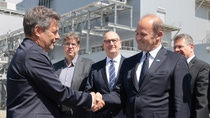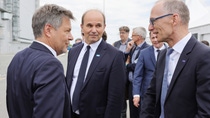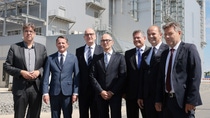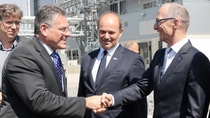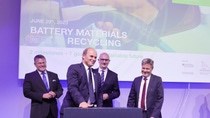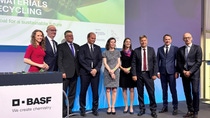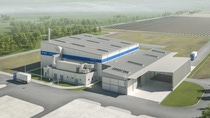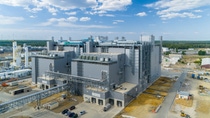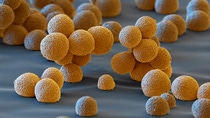News
Battery materials meet recycling: BASF is the first company to establish a co-located battery materials and recycling center and close the loop in the European battery value chain
- Inauguration of first state-of-the-art high-performance cathode active materials production plant in Germany
- Kick off for world-class battery recycling plant to produce black mass in Europe in the most sustainable way
- Proprietary production technologies will allow significantly reduced carbon footprint for cathode active materials
Together with customers, politicians and partners, BASF today (June 29, 2023) celebrated the opening of Europe’s first co-located center of battery material production and battery recycling in Schwarzheide, Germany. The inauguration of a state-of-the-art production facility for high-performance cathode active materials and the unveiling ceremony for a battery recycling plant for the production of black mass represent important steps toward closing the loop for the European battery value chain – from the collection of used batteries and the recovery of mineral raw materials to their use in the production of new battery materials.
Major step in Europe to participate in the rapidly growing global battery market
Battery materials are at the heart of lithium-ion batteries as they significantly determine their performance and therefore play a crucial role in the transformation of mobility.
“Despite all challenges we are currently facing in Europe, today is a reason for all of us to be optimistic. The state-of the art cathode active materials plant and the recycling plant for black mass production underline that we at BASF believe in the future of the chemical industry in Europe and in Germany and invest in innovative products and services for our customers in our home market,” said Dr. Martin Brudermüller, Chairman of the Board of Executive Directors of BASF SE. “With our two investments we significantly contribute to the reduction of the CO2 footprint of batteries and close the loop for sustainable mobility.”
European Commission Vice President Maroš Šefčovič emphasized the importance of creating a competitive and sustainable battery cell manufacturing value chain in Europe. “The EU battery market is rapidly growing. Demand for batteries is expected to continue to increase drastically in the coming years for both mobility and storage, and our competitors are also pursuing this market. In this context, the European Commission is committed to keep building a solid battery ecosystem in Europe. This is why we have created the European Battery Alliance, which has helped to generate more than €180 billion in private investments so far. The BASF plant benefited from this work. With its focus on advanced cathode active material and on recycling, it demonstrates that we can boost the EU’s competitiveness and reduce its dependencies in a strategic sector, and accelerate the green transition.”
First production of cathode active materials in Germany
The new plant is not only the first production facility for high-performance cathode active materials in Germany, but also the first fully automated large-scale cathode active materials production facility in Europe. The plant is fully sold out for the next years and will supply products tailored to the specific needs of cell manufacturers and automotive OEMs in Europe. The carbon footprint of BASF’s innovative cathode active materials is significantly lower than the industry benchmark thanks to BASF’s proprietary efficient production technologies, which include minimized energy consumption and a high proportion of renewable energy. In order to meet growing customer demand for the European electric vehicle market, BASF is already preparing additional investments for cathode active materials in Europe and is in advanced negotiations with customers. This underlines BASF’s commitment to establishing a robust, localized battery value chain in Europe.
Dr. Robert Habeck, Federal Minister for Economic Affairs and Climate Action said: “With the combination of a state-of-the-art CAM manufacturing and a recycling facility, Germany gains a key piece of the puzzle for its growing battery ecosystem. BASF's project increases our sovereignty along the value chain, promotes the circular economy and thus strengthens economic security. The decision in favour of Schwarzheide underscores the attractiveness of the site – its history and chemical knowhow as well as its abundance of renewable energy in the vicinity. The project also highlights the ongoing transformation: Here, where coal was long liquefied into gasoline, the active material for EV batteries will be produced from now on. We are happy to support this transformation with IPCEI funding.”
Closing the loop for battery materials
BASF already offers cathode active materials based on recycled metals as a closed-loop solution in Asia and North America to conserve resources and further reduce their CO2 footprint. With the investments in Schwarzheide, BASF is now directly supporting the European market and at the same time enabling faster growth for its global business. End-of-life batteries and waste from battery production are mechanically processed in the new plant for black mass production. “Black mass” contains key metals used to make cathode active materials: lithium, nickel, cobalt and manganese. In a second step, these valuable metals can be chemically recovered in the most sustainable way and used to produce new cathode active materials. Construction of a black mass production facility has already begun, and production is expected to start in 2024.
“By establishing our first European co-located center for battery materials and recycling, we want to strengthen the battery value chain in Europe,” said Dr. Peter Schuhmacher, who is responsible for BASF’s Battery Materials and Recycling business and President of the Catalysts division. “We will continue to close the loop and invest in our production and recycling capacities globally to meet the demand of our customers for high-performance cathode active materials with a low CO2 footprint.”
Growth impulses for Schwarzheide site
The two plants will expand the product portfolio at BASF’s Schwarzheide site and create a total of around 180 new jobs.
“Lusatia is and will remain an industrial and energy region. The products will be renewable, more environmentally friendly and more sustainable. The new plants for battery materials at BASF Schwarzheide contribute to the success of the transformation in the previous coal-mining region. With the production of battery materials, battery production and their recycling, a new, unique branch of industry is being created in Brandenburg, with which we are opening another chapter in the energy transition. Not only will new industrial jobs be created. A strong contribution is being made here to the independence of the European economy, to domestic value creation and to climate protection,” said Dr. Dietmar Woidke, Minister President of the State of Brandenburg.
The investments reinforce BASF’s support of the European Commission’s agenda towards a European battery production value chain and is part of the “Important Project of Common European Interest (IPCEI)” approved by the European Commission on December 9, 2019, under the European Union State aid rules. The launch of innovative battery materials and research to develop next-generation battery materials and process development, including battery recycling, is funded by the Federal Ministry of Economic Affairs and Climate Action based on a resolution of the German Bundestag and by the Ministry of Economics, Labor and Energy of the State of Brandenburg based on a resolution of the Brandenburg State Parliament as part of the IPCEI for Batteries: Funding codes 16BZF101A/B.
In the virtual press kit of the event, you can find TV footage and photo material of the event.
You can find TV footage and additional photo material of BASF’s battery material research and production sites in our TV-service and photo pool (please choose “battery” as search term).
Photos from the event will be available online as of 2:00 p.m. CEST.
About BASF Battery Materials and Recycling
BASF is a leading global supplier of advanced cathode active materials (CAM) for the lithium-ion batteries market, providing high performance CAM to the world’s largest cell producers and for leading platforms of OEMs. In addition, we offer base metals sourcing and management as well as closed loop battery recycling solutions. By leveraging our industry-leading R&D platforms and passion for innovation, BASF’s Battery Materials and Recycling unit develops unique, proprietary solutions that drive customer success.
BASF Battery Materials and Recycling is part of BASF’s Catalysts division. The division’s portfolio also includes Environmental Catalysts and Metal Solutions, as well as Process Catalysts. Customers from a variety of industries including Automotive & Transportation, Chemicals, Plastics or Energy & Resources benefit from our innovative solutions. Further information on BASF’s Catalysts division is available on the Internet at www.catalysts.basf.com.
About BASF
At BASF, we create chemistry for a sustainable future. We combine economic success with environmental protection and social responsibility. More than 111,000 employees in the BASF Group contribute to the success of our customers in nearly all sectors and almost every country in the world. Our portfolio comprises six segments: Chemicals, Materials, Industrial Solutions, Surface Technologies, Nutrition & Care and Agricultural Solutions. BASF generated sales of €87.3 billion in 2022. BASF shares are traded on the stock exchange in Frankfurt (BAS) and as American Depositary Receipts (BASFY) in the United States. Further information at www.basf.com.


